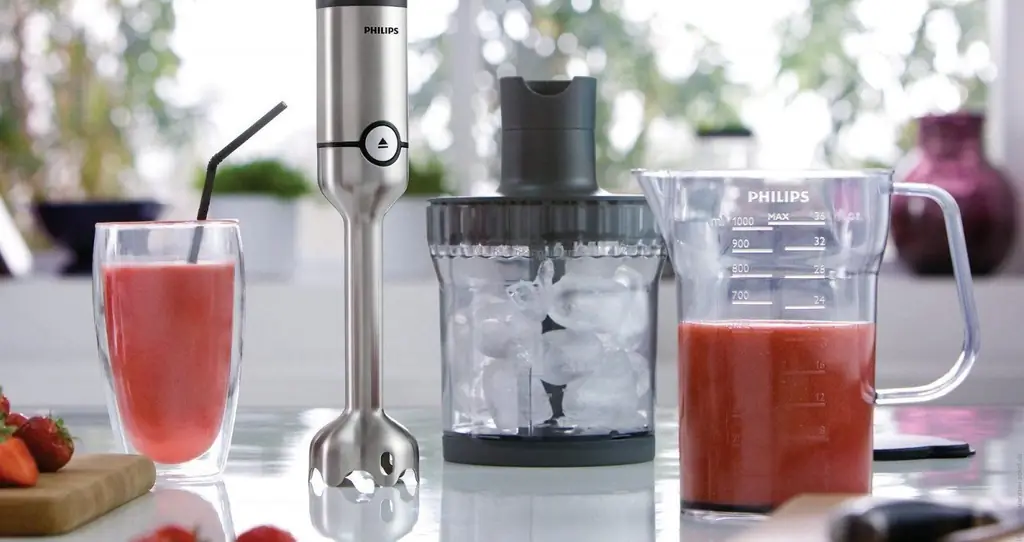
Table of contents:
- Author Bailey Albertson [email protected].
- Public 2024-01-17 22:26.
- Last modified 2025-01-23 12:41.
An irreplaceable assistant in the kitchen: choosing a hand blender
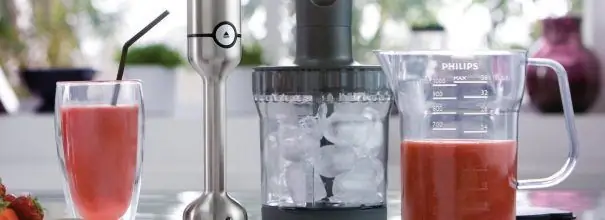
If you don't have a hand blender yet, you are missing out on a lot. For example, such an invaluable resource as the time spent preparing food. Be sure to purchase this useful device. And we will show you how to choose the right hand blender, what parameters to pay attention to when buying, in order to get exactly what you need.
Content
-
1 Advantages of a hand blender over a stationary
1.1 Table: Comparative list of tasks for different types of blenders
-
2 What are the nuances worth considering to choose a quality blender
- 2.1 Power
- 2.2 Speeds, their number and switching
- 2.3 Package contents
- 2.4 Main nozzle material
- 2.5 Wire or battery power
- 2.6 Accessories
-
3 Rating of hand blenders for home
-
3.1 Table: quality blenders from different manufacturers
3.1.1 Photo gallery: popular models of hand blenders from Bosch, Brown and other firms
-
- 4 Customer Reviews
- 5 Video: choosing a hand blender together with "Test purchase"
Advantages of a hand blender versus a stationary blender
Each housewife wants her dishes to be the most delicious, satisfying and healthy for her family. We all know that cooking often takes a long time. Most of it is spent on chopping and mixing products. This is where scientific and technological progress comes to our aid. There are many devices for the modern kitchen: electric meat grinders, food processors with a high level of functionality. But they can take up a lot of space, and you don't want to keep such devices constantly at hand to prepare a small portion. This is why compact, handy blenders have become so popular.
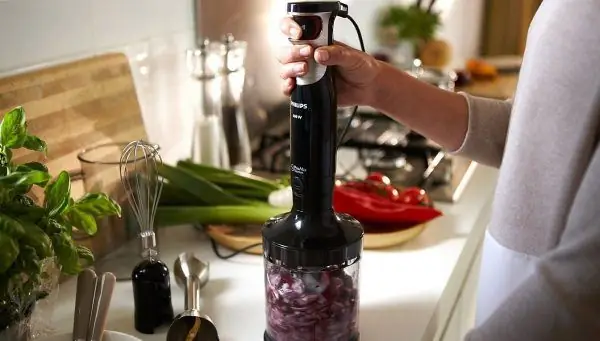
Blenders have become familiar helpers in the kitchen
The principle of operation of any blender is simple: you put food in a bowl, turn on the desired mode, and the device grinds them, mixing them into a homogeneous mass. There are slight differences in the process of using a stationary and submersible blender. Let's find them out.
A stationary blender (shaker) is a deep bowl with knives fixed to the bottom and a tight-fitting lid. It has fewer functions than a submersible. It is most suitable for making cocktails and puree soups, that is, for whipping and stirring liquids or soft foods.
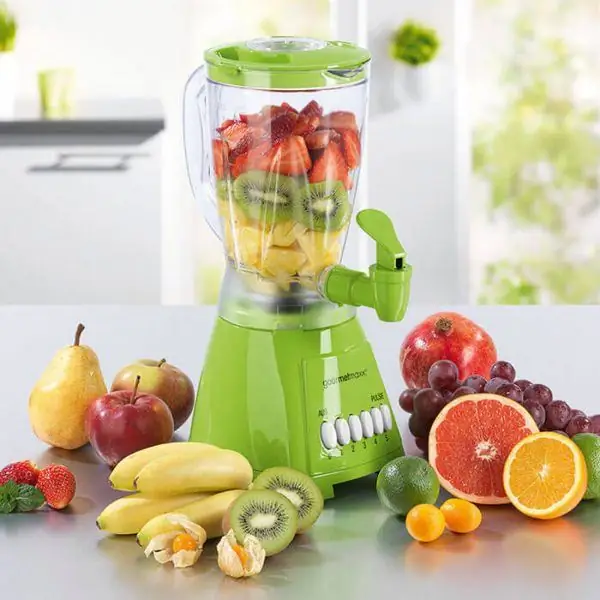
The stationary blender handles soft and liquid foods well, and can also chop ice if its bowl is made of glass
A hand blender can be compared in appearance to a pestle. It is simply immersed in a bowl of food and the power button is pressed. If you need to process a large volume of product, the process will be quite tedious, unlike using a stationary device.

Most of your daily meals can be made easier with the hand blender
But the submersible blender can not only puree, but also finely chop food in a special container-attachment, which looks like a reduced food processor. It will quickly cope with grinding tough ingredients: meat, nuts, raw vegetables and fruits.
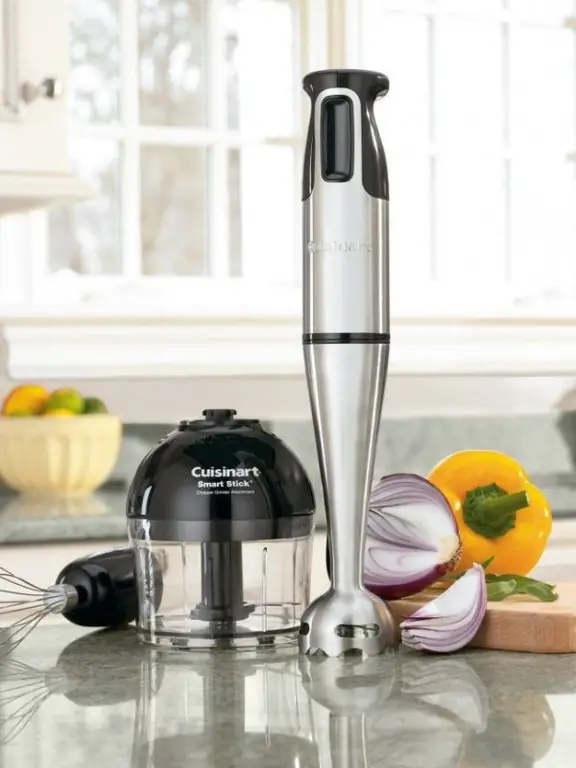
Hand blender with chopper attachment is suitable for more types of food than the stationary one
What can a hand blender cook? Almost anything from your daily menu. For example:
- puree soups;
- minced meat or fish;
- batter;
- sauces;
- smoothies;
- salads;
- vegetable purees;
- any puréed food for a small child.
Table: Comparative list of tasks for different types of blenders
| A task | How does it manage | |
| stationary blender | hand blender | |
| Grind the puree soup | fine | well |
| Chop nuts | well | fine |
| Grind the bread crumbs | well | fine |
| Crush the ice | fine | well |
| Mix cocktail | fine | well |
| Mix cocktail with ice | fine | well |
| Beat the egg until froth | badly | fine |
| Whisk the mayonnaise | badly | fine |
| Knead the dough into pancakes | badly | well |
Apparently, a hand blender will be able to help you cope with more tasks in the kitchen than a stationary one.
What are the nuances to consider when choosing a quality blender
Like any electronic device used in everyday life, the hand blender has characteristics that you should pay attention to when choosing. These include:
- device power;
- speed of work, their number and method of switching;
- number of nozzles;
- the material of which the nozzles are made;
- wire or battery power;
- additional devices.
Let's consider them in more detail.
Power
Hand blenders, depending on the model, have a power indicator in the range of 140-1200 watts. This directly affects the number of functions and their performance. For example, you will not be able to cope with minced meat using a blender with an operating power of less than 250 W, the product will not be chopped, but "wound" on knives. The optimal indicator for such work is 250-600 watts. Solid foods such as ice will require at least 400 watts.
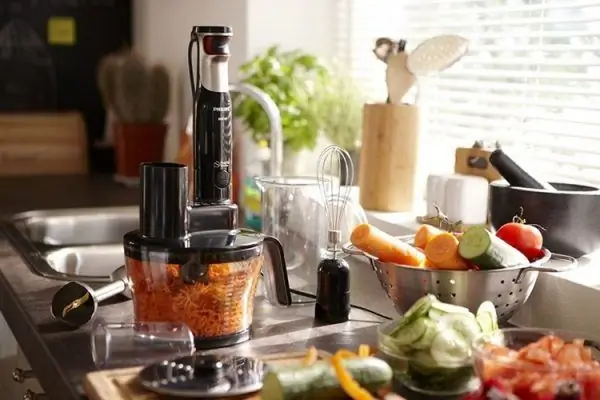
The higher the power of the blender, the wider the range of products with which it can handle
The power of the device also indirectly determines the speed of operation. "Weak" and "strong" hand blenders will cope with beating eggs equally quickly, but for cutting raw vegetables or making pureed soups, it is better to use a device with a higher power.
For simple meals, a 300-400 W blender is enough. But if it is supposed to chop ice, prepare minced meat, work with tough foods, it is better to take a device for 500-800 W, otherwise the blender will quickly break from overload.
Speeds, their number and switching
Different models of hand blenders have from 1 to 24 speeds. As a rule, the cheapest models have the same speed. It will be inconvenient to use them, since high speed when working with liquid products requires increased dexterity and accuracy in order to avoid splashes. The more speeds the blender has, the easier it will be for you to select a convenient processing option for each product. For example, start chopping meat at a lower speed, gradually increasing it - this will make the minced meat more tender and softer. Or beating eggs: if you are doing this in a low bowl, it is better to use a low speed, and in a high bowl, a high speed.
Typically, a 5-8 speed blender is sufficient for home kitchen work. A large quantity can lead to confusion, while a smaller quantity will not be very convenient to handle some products. In addition, the number of speeds affects the price of the product. There are two types of switching between speeds - smooth (relay type) and step. Changing the speed depending on how hard the button is pressed is called pulse mode.
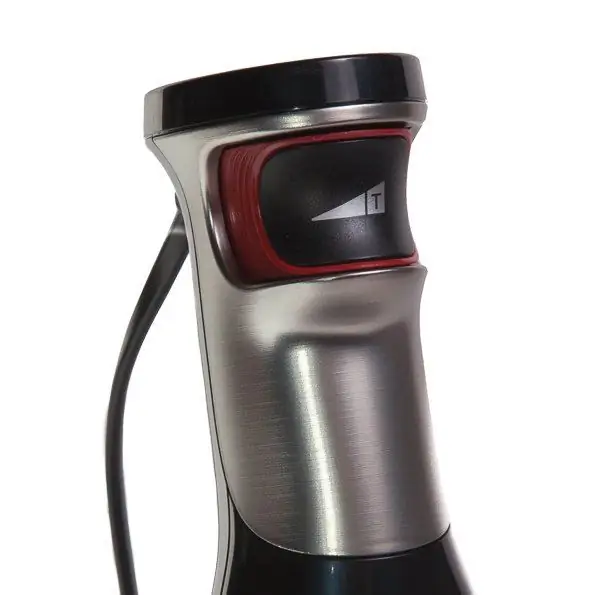
Choose a blender with a convenient way of switching speeds
The smooth shifting function makes it easier for you to find the right mode of operation than step switching. Pulse mode affects the frequency at which the blender stops to switch speed. If available, you can set a higher speed directly during operation, and then change it by pressing force.
Equipment
Modern blender models can be easily compared with food processors, only with less power and bowl capacity. The open system of the device allows a lot of flexibility, especially if your model has additional attachments. A standard hand blender consists of 3 main parts:
- handles with motor inside,
- main immersion nozzle for puréing,
- chopper attachments.
The capabilities of the device depend on how many attachments are in the kit and how to use them.
The main nozzle is used in most work with a blender, therefore it is included in the complete set of absolutely all models. It is a continuation of the handle, has a knife at the end in a small recess. Most often, this knife is installed permanently, but some models have removable, replaceable knives. With the help of the main attachment, you can work not only in the bowl, which is sometimes included in the kit, but also in any other utensil, up to a saucepan or deep bowl. If the nozzle is metal, then it can be safely used for hot products.

The main nozzle purees liquid and soft foods
Chopper is a chopper attachment in the form of a small bowl with knives fixed at the bottom of it. She does an excellent job with minced meat or fish fillets and, for example, slicing onions and carrots for soup, as well as chopping greens and nuts.
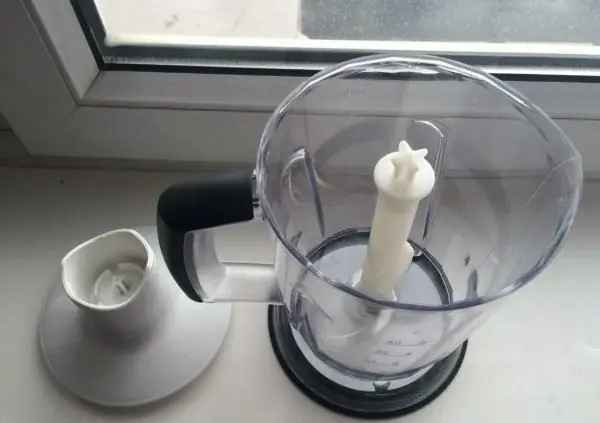
Chopper attachment for minced meat and vegetables
Some expensive models provide a multifunctional shredder with an enlarged bowl, equipped with replaceable attachments, knives, graters, and slicing discs. This bowl turns the hand blender into a food processor with a light movement of the hand. You can beautifully cut cheese, sausage and any vegetables.
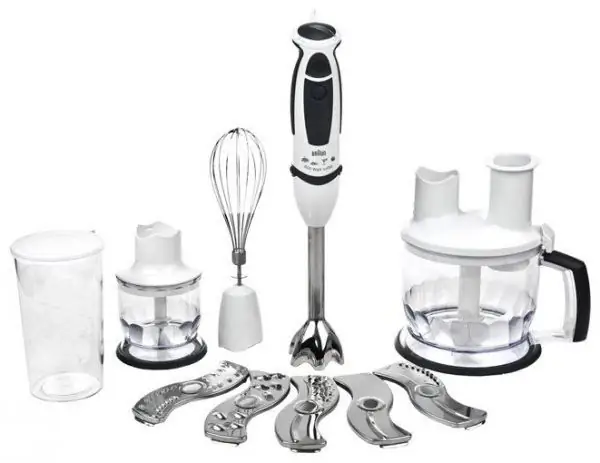
The blender kit can include choppers of different sizes and additional knives for them
The whisk attachment, which is sometimes included, is suitable for beating eggs, creams, and batter. However, be aware that it cannot fully replace the mixer; when kneading thick dough, the device will most likely begin to overheat. The blender teardrop whisk has a rather weak wire.
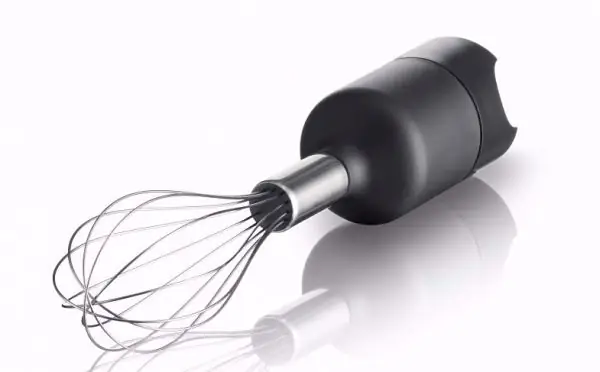
Hand blender whisk great for beating eggs
Another additional attachment, which is not found in all blender models, but will be useful in the household, is a vacuum pump. Using it, you can quickly evacuate air from plastic containers. This way food can be stored for much longer.

Vacuum blender pump will keep processed foods longer
The basic attachment is a must for any hand blender model. The choice of the rest, you can adjust as you wish, depending on what devices your kitchen is already equipped with. For example, if you have a food processor or electric meat grinder, you can refuse the multifunctional chopper bowl.
Main nozzle material
The durability of the device and its ability to operate under certain conditions, for example, with hot food, depend on this characteristic.
For the main nozzle, 2 materials are used - plastic and metal.
The only plus of the plastic nozzle is its cheapness. But there are many disadvantages:
- You can work with hot food with a plastic attachment, but the higher the temperature, the faster the product will be damaged.
- Plastic tends to wear out over time.
- Plastic changes color from certain foods (carrots, beets). Within six months, you will begin to notice it by stains that cannot be removed.
-
Even durable plastic is not immune to breakage. Dropping such a nozzle, you break it much easier than a metal one.

plastic blender attachment Plastic blender attachment is short-lived and quickly loses its appearance
Perhaps, even if you are on a limited budget, it is better to pay attention to a blender with a metal attachment. It will perfectly handle any food, even very hot, and will last much longer.
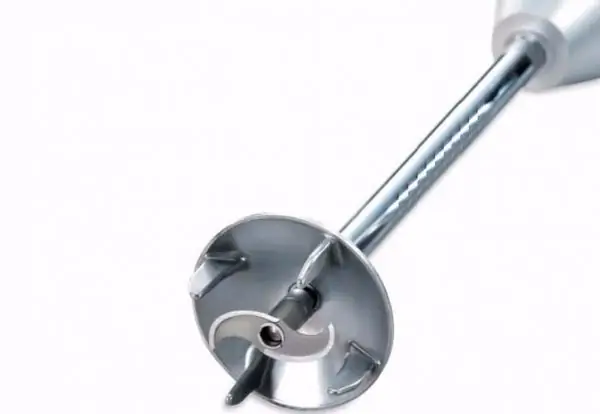
Metal nozzles are durable and are not afraid of hot foods
Wire or battery powered
Most blenders are wired and powered. But progress does not stand still, device mobility is becoming more important, so manufacturers increasingly offer customers wireless models that run on batteries.
The advantages of a wire blender are that the weight of the device is significantly less than the battery version. This is very important, because when you work, you hold it in your hands. But the wire greatly reduces the ability to move: you cannot go far from the outlet, using an extension cord is not always convenient.
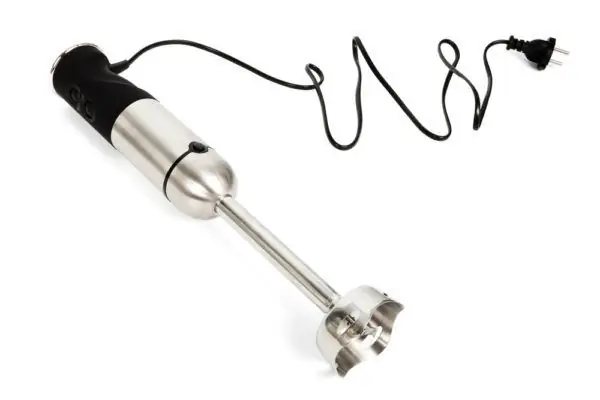
A blender with a power cord is lighter in weight, but does not provide much freedom of movement
A battery-powered blender will allow you to cook not only in the kitchen, but also anywhere in the apartment, regardless of outlets. And on a short trip you can take it with you without difficulty. True, such a device is heavier, its power is lower, which means that there are fewer functions than in a wired analogue. The operating time of a fully charged blender is no more than 30 minutes, and the batteries will have to be recharged up to 4 hours.
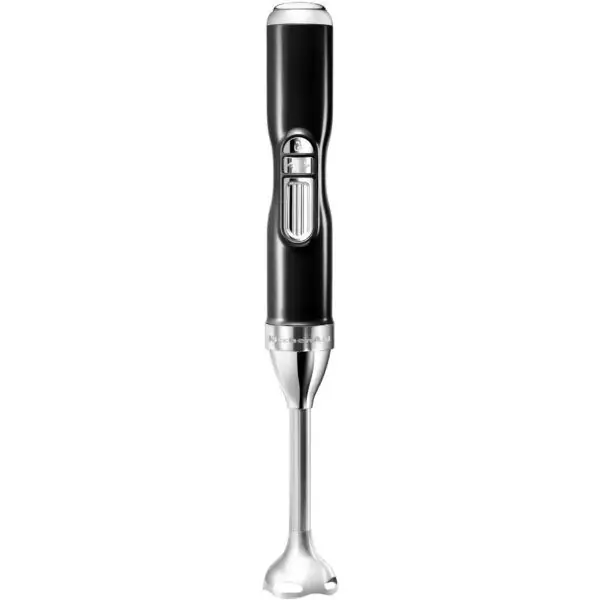
Battery-powered hand blender is much more mobile, but has fewer features
Additional accessories
Many manufacturers supply their blender models with additional little things that are not at all necessary in work, but are very pleasant as a bonus.
-
A wall mount that can hold the assembled blender, and in some cases, another attachment. Most models have it.

blender on the mount Wall mount for convenient storage of the hand blender
-
The stand is an analogue of a wall mount, only installed on a table. It looks stylish and elegant.

blender on a stand The blender stand looks stylish and is also easy to use
-
Measuring cup for determining the amount of food. All blenders are equipped with it. Usually it is also equipped with a lid, that is, it is suitable for storing cooked food.

measuring cup for blender A measuring cup will help determine the right amount of food or finished puree
Rating of hand blenders for home
Before you go to the store for a hand blender, we also recommend reading customer reviews on the Internet. You will be able to compare models and make the right choice based on the experience of other people. The data for this table was taken from the Yandex. Market resource.
Table: quality blenders from different manufacturers
| Manufacturer, model | Description | Power | Advantages | disadvantages | Customer ratings | approximate cost |
| Bamix Swissline Superbox |
|
200 watts |
|
|
4 out of 5 | 10500 RUB |
| Philips HR 1379 |
|
300 watts |
|
|
4.5 out of 5 | 10,000 RUB |
| Braun MR 6550 MFP HC |
|
600 watts |
|
|
4 out of 5 | 6700-7000 RUB |
| Bosch MSM 7700 mixxo quattro |
|
750 watts |
|
Users complain about the short operating time: individual parts quickly break, especially with frequent use. | 3.5 out of 5 | 4700 RUB |
| Binatone HB 733 |
|
700 watts |
|
Users complain about inconvenient buttons and frequent product breakdowns. | 2.5 out of 5 | 3000 RUB |
| Moulinex HAPTO DD 853 |
|
700 watts |
|
|
3.5 out of 5 | 4000 RUB |
Photo gallery: popular models of submersible blenders from Bosch, Brown and other firms
-

Bamix Swissline Superbox - Hand blender Bamix Swissline Superbox
-

Binatone HB 733 - Hand blender Binatone HB 733
-

Bosch MSM 7700 mixxo quattro - Hand blender Bosch MSM 7700 mixxo quattro
-

Braun MR 6550 M FP - Hand blender Braun MR 6550 M FP
-

Moulinex DD853 - Hand blender Moulinex DD853
-

Philips HR 1379 - Hand blender Philips HR 1379
Customer Reviews
Video: choosing a hand blender together with "Test purchase"
About the immersion blender, you can safely say: "Small, but smart!" Although it will not replace your food processor, mixer or electric meat grinder when you need to process a large amount of food, it will be simply irreplaceable for small cooking tasks. Tell us in the comments what you most often pay attention to when choosing such a device and working with it, which functions are more important to you, which model, in your opinion, is better. Good luck!
Recommended:
How To Choose The Right Grinder: Which Angle Grinder Is Better For Home And Summer Cottages + Video
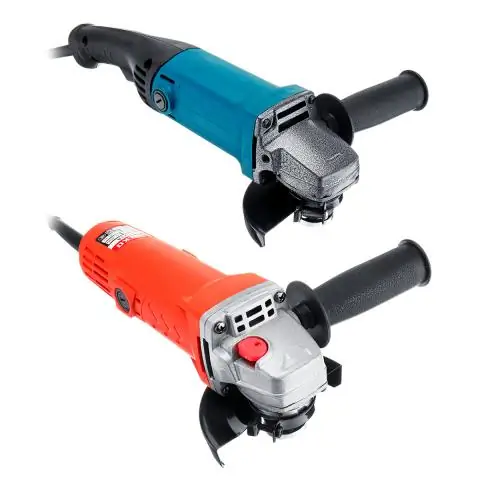
Grinder selection criteria. Rating of the most popular models. Reviews of manufacturers. Tips: how to choose a grinder for home, professional use
How To Choose A Cordless Screwdriver For Home + Video And Reviews
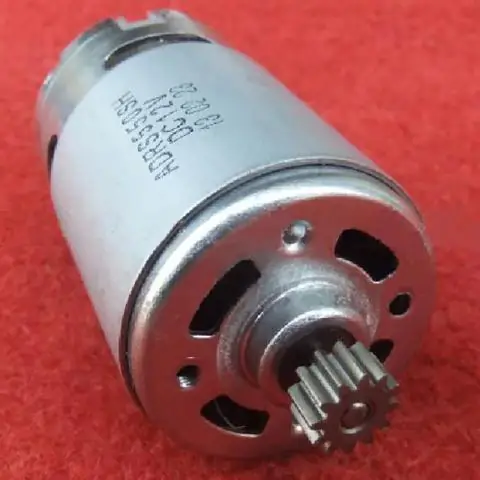
Useful tips on how to choose a cordless screwdriver model for your home. Consumer reviews
How To Make Yogurt At Home - Recipes For Making Drinking, Greek And Other Options From Milk (including Goat Milk), In And Without A Yogurt Maker, Video And Reviews
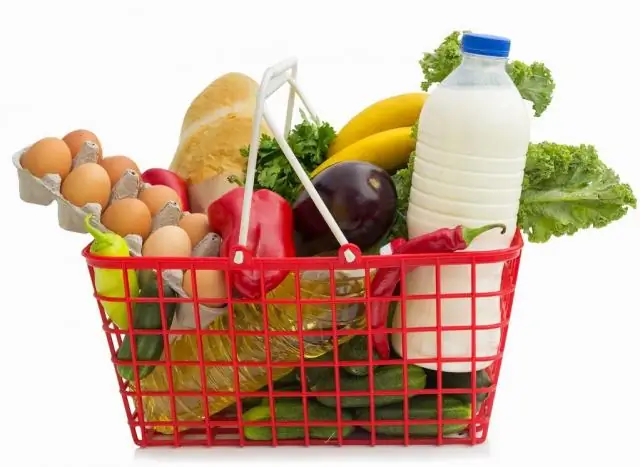
Properties and types of yoghurts. How to choose products. Homemade recipes in a yogurt maker and without
Trimmer For Nose, Ears And Eyebrows: Which One Is Better To Choose, How To Use + Video
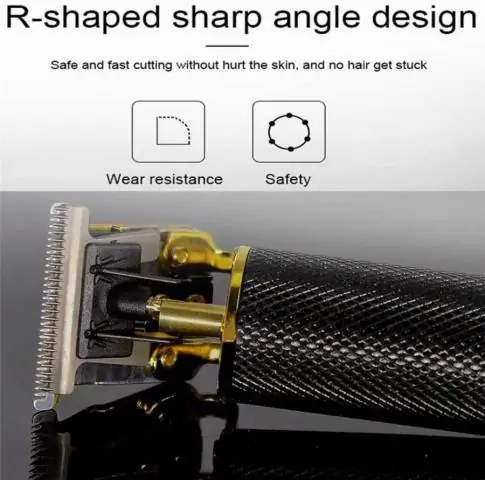
Trimmer for nose, ears and eyebrows, its purpose, device and principle of operation. The main criteria for choosing the ideal device, features of care and repair
What Green Manure Is Better To Sow In The Fall: A Review With Reviews And Video

What are siderates. What is the use of them. What green manure is better to sow in the fall: an overview of the groups. Reviews
